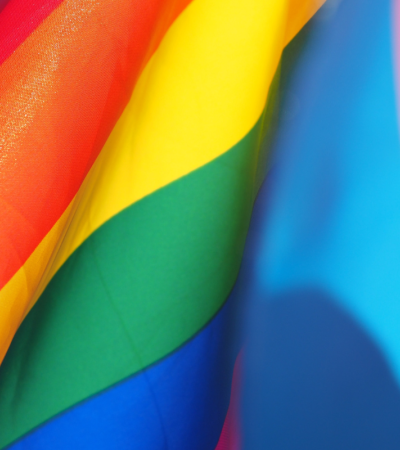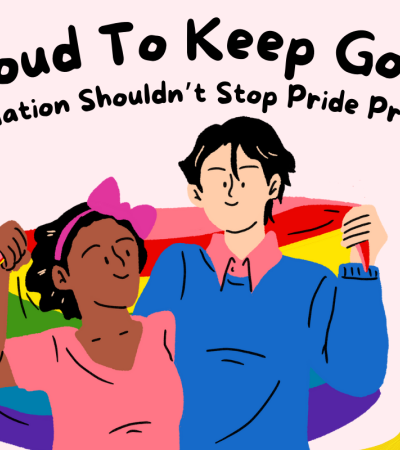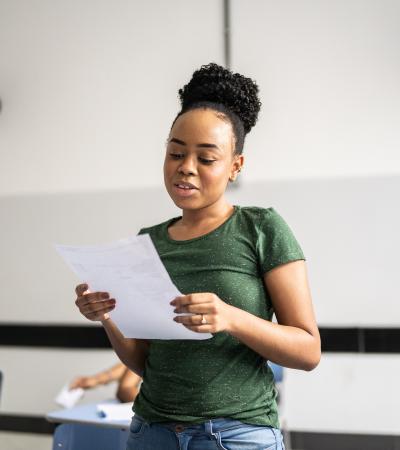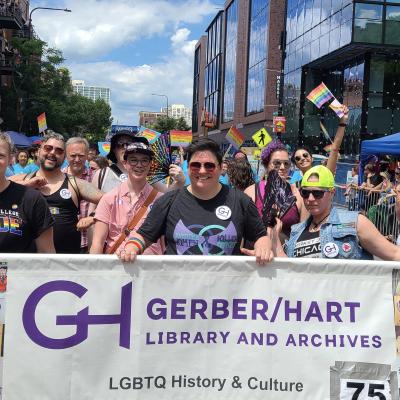
Nestled inside a health clinic on the north side of Chicago, the Gerber/Hart Library has been collecting and preserving the history and culture of LGBTQ+ communities in Chicago and the Midwest since 1981.
The Gerber/Hart is a free, public, lending library with a large collection of books, eBooks and audiovisuals with everything from popular contemporary literature to VHS tapes for checkout. Their ever-growing archive of primary sources allows the public to explore and discover the rich history of Chicago’s LGBTQ+ communities through donated diaries, photo albums, posters, costumes and more.
With a clientele tailored to a particular interest or subject matter, specialized libraries curate collections that cater to niche interests. Despite assumptions that such libraries may not actively engage with the local community or offer public programs, special libraries like the Gerber/Hart prove otherwise, largely thanks to volunteers.
A calendar full of community events
To enhance community awareness of its presence, the Gerber/Hart Library has expanded its outreach efforts in recent years. With an ongoing commitment to fostering connections, the library seeks partnerships across Chicago to speak to its mission of being a “safe and welcoming atmosphere that reflects the diversity of the communities that it serves.”
Gerber/Hart has a robust program schedule; in just one week in May, the library hosted a panel talk with Chicago Tap Theater, a play by a local acting group, an author talk and an off-site community reading at a bookstore.
Jen Dentel, community outreach and strategic partnerships manager, started as a volunteer at the library ten years ago and aspires to expand the library’s reach even further. “Right now, we are overly representative of one area of the city,” Dentel says. “A goal is to find partners in other neighborhoods of Chicago that we haven’t worked with yet.”
Alongside the vast array of public programs and events held at the library or off-site at partner locations, the library also offers its extensive archives to collaborate with partners. Recently, the library welcomed participants of the LGBTQ+ Intergenerational Dialogue Project for a tour of the collections and archive to help inspire and direct conversations between LGBTQ+ elders and young people.
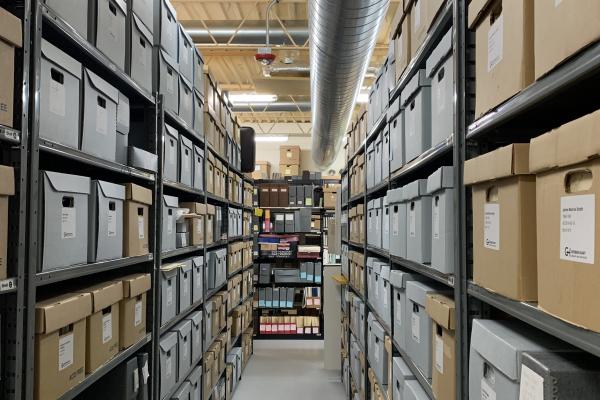
Collaborating with local schools is also an important aspect of the library’s work. After receiving a grant for the DePaul University’s Experiential Humanities Collaborative, students in the experiential learning course, Do Say Gay: Banned Books and LGBTQ+ Freedom, visit the library once a week to research the library’s collections and archives. The students are now working to create a public exhibit at the Gerber/Hart about banned books, censorship and queer repression.
The library also offers tours to local high schools and universities. Tours are an important entry point for many volunteers and raise general awareness that the library exists, is free and is open to all. “People brighten up and ask more questions when they get a tour and see the collections,” says Erin Bell, operations director. “Oftentimes, a quick look at the archives isn’t enough, and people want to stay and volunteer, which is why we are in such high demand! We have a growing list of volunteers — around 130 are active and come by regularly.”
A collection to inspire volunteer-led creation
After being run by volunteers for most of its 43-year history, Gerber/Hart now has three full-time staff members but continues to rely on a large group of dedicated volunteers. These volunteers help process collection materials, catalog donations, staff the circulation desk and assist with public programs, exhibits and book displays.
“We take our volunteers’ ideas very seriously,” Dentel says. “If a volunteer has a book display idea, we usually let it happen and give them full creative control. We had a volunteer-curated book display recently, and the theme was salt.”
From hyper-specific book displays to creative exhibits, the vast collections of the Gerber/Hart can inspire endless stories waiting to be told.
Over the summer, a volunteer spearheaded a popular exhibit, A Dreamhouse of Our Own: An Examination of Dolls, Play, and Queer Identity. Housed in a display case decked out to look like a Barbie dreamhouse, the exhibit opened with a sold-out reception, complete with themed cocktails, an artist talk and screening of the film “Life Size” (2000).
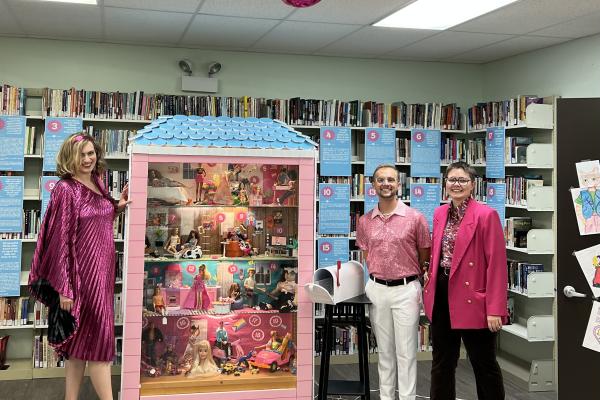
“It’s so much fun to work with volunteers on these amazing projects,” Dentel says. “The doll exhibit was not just a success for our volunteers, but it opened a lot of great partnership opportunities for the library and got the word out on Gerber/Hart in general. The exhibit was such a community-centered experience in every aspect, from the curation to the opening event.”
With such an extensive archive of materials, there are endless opportunities for creation and teaching. “The Gerber/Hart is a mix of community and history and archives,” says Bell. “We’ve had local artists create work using materials in our archives for an exhibit. There’s so much to see, work with and learn from.”
To learn more about the Gerber/Hart Library, check out their website and podcast, Unboxing Queer History, which tells stories from the library’s collections and archives.

